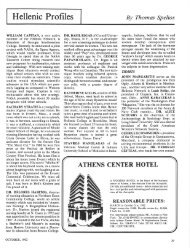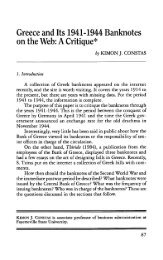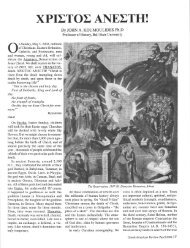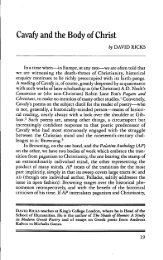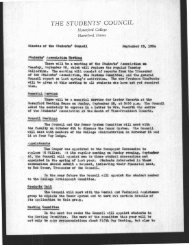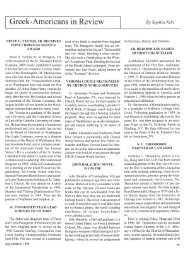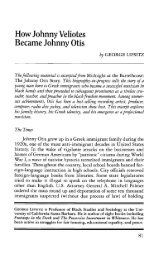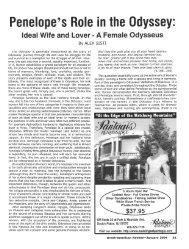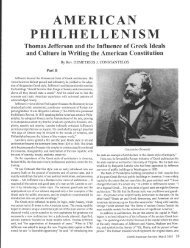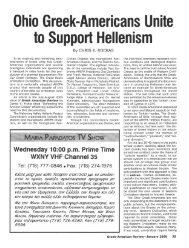The History Man
The History Man
The History Man
Create successful ePaper yourself
Turn your PDF publications into a flip-book with our unique Google optimized e-Paper software.
42 JOURNAL OF THE HELLENIC DIASPORA<br />
enced (in terms of an open future—Phernazes does not know what is going<br />
to happen).<br />
<strong>The</strong> present of the poem (Cavafy's) includes the awareness of Phernazes'<br />
present as fixed in a pattern which could only be perceived long<br />
after the event. This dual perception of a historical moment is poignantly<br />
reinforced by the nature of the dilemma facing Phernazes in Cavafy's<br />
poem. He, Phernazes, faces the same problem that Cavafy, in bringing<br />
Phernazes' consciousness to us, simultaneously surmounts: how to bridge<br />
the gulf between the historical and the experienced past, how to depict<br />
the "emotions" (the nature of the experience) of a historical character<br />
at a historic moment. It is perhaps for this reason that Cavafy's poem<br />
bears a title apparently more appropriate to Phernazes' work-in-progress<br />
than to his own completed poem.<br />
<strong>The</strong> poetic function fulfilled or attempted by Cavafy and his creation,<br />
Phernazes, seems then to be to recuperate historical time as experienced<br />
time, and bring it within the ambit of personal memory and the individual<br />
imagination with which the poet assimilates and refurbishes his own<br />
experience. <strong>History</strong> interrupts the poet's act of creativity, but that act was<br />
itself partly dedicated to the recuperation of the historical past, and is<br />
in turn recuperated for us as a part of history. Even the eruption of<br />
history in the form of real and decisive events is not unambiguously<br />
treated. D.N. Maronitis, in a perceptive essay on this poem (1970), goes<br />
beyond what is explicitly stated in the text and interprets Phemazes'<br />
dilemma as, in part, a pragmatic one: will the attribution of "intoxicated<br />
pride" to his illustrious ancestor be flattering to the king who is Phernazes'<br />
patron? (According to this reading, "philosophy" in the seventh line<br />
also means, ironically, something like "circumspection.") Maronitis further<br />
believes that the last four lines of the poem are causally connected<br />
to what has gone before: because of what has happened, Phernazes makes<br />
up his mind to write, after all, that it was "intoxicated pride" that<br />
Dareios experienced. According to this reading, the historical tide that in<br />
the poem begins to sweep away Phernazes and "Greek poems" together<br />
with the kingdom of Pontos, in fact liberates the poet. It inspires him<br />
with the correct and satisfying solution to his artistic dilemma, but it<br />
simultaneously removes altogether the pragmatic dilemma that had faced<br />
him. If Mithridates is never going to read the poem and reward the poet,<br />
if, most probably, the poem is never even going to be finished, then<br />
what need is there to flatter anybody? What need, either, to worry about<br />
dumbfounding his critics?<br />
Whether Maronitis's additional subtlety is accepted or not, what is<br />
ultimately validated in this poem seems to be the "poetic idea" of the<br />
third from last line. This is what matters: the act of creativity, whether<br />
the writing of verses, the making of wine bowls, or the fashioning of<br />
statues. <strong>The</strong> creative act is more important than the artifact in which it<br />
results: the insistence of the poetic idea that haunts Phernazes is more<br />
important than the poem he would in other circumstances have completed,<br />
and which would most probably have suffered, in due course, the fate of



